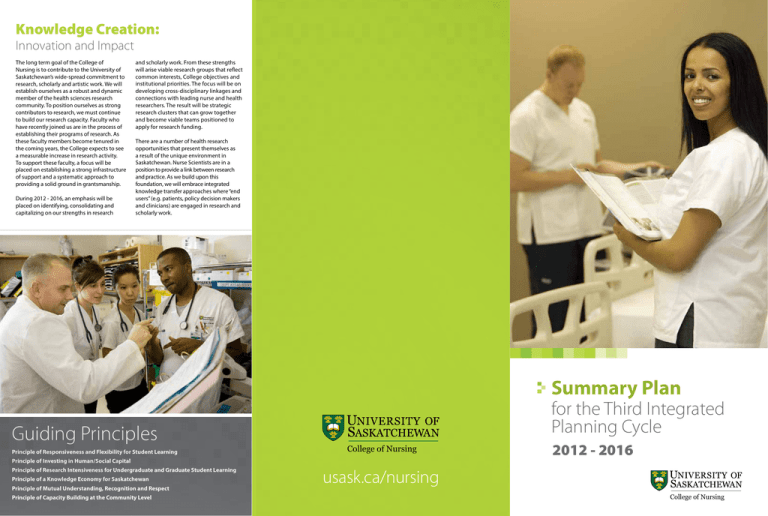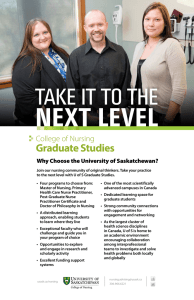Document 12010703
advertisement

Knowledge Creation: Innovation and Impact The long term goal of the College of Nursing is to contribute to the University of Saskatchewan’s wide-spread commitment to research, scholarly and artistic work. We will establish ourselves as a robust and dynamic member of the health sciences research community. To position ourselves as strong contributors to research, we must continue to build our research capacity. Faculty who have recently joined us are in the process of establishing their programs of research. As these faculty members become tenured in the coming years, the College expects to see a measurable increase in research activity. To support these faculty, a focus will be placed on establishing a strong infrastructure of support and a systematic approach to providing a solid ground in grantsmanship. During 2012 - 2016, an emphasis will be placed on identifying, consolidating and capitalizing on our strengths in research and scholarly work. From these strengths will arise viable research groups that reflect common interests, College objectives and institutional priorities. The focus will be on developing cross-disciplinary linkages and connections with leading nurse and health researchers. The result will be strategic research clusters that can grow together and become viable teams positioned to apply for research funding. There are a number of health research opportunities that present themselves as a result of the unique environment in Saskatchewan. Nurse Scientists are in a position to provide a link between research and practice. As we build upon this foundation, we will embrace integrated knowledge transfer approaches where “end users” (e.g. patients, policy decision makers and clinicians) are engaged in research and scholarly work. Summary Plan Guiding Principles Principle of Responsiveness and Flexibility for Student Learning for the Third Integrated Planning Cycle College of Nursing Principle of Investing in Human/Social Capital Principle of Research Intensiveness for Undergraduate and Graduate Student Learning Principle of a Knowledge Economy for Saskatchewan Principle of Mutual Understanding, Recognition and Respect Principle of Capacity Building at the Community Level 2012 - 2016 usask.ca/nursing College of Nursing Culture and Community: Message from the Dean Our Global Sense of Place The College of Nursing has implemented a Global Health Framework, which will position the College nationally and internationally as a leader. Local and international initiatives and outreach at the College of Nursing will be integrated within the framework with a specific focus on rural, remote, northern and Indigenous peoples. We will develop and strengthen the link between local and international initiatives in undergraduate and graduate education, including clinical placements. We will also strengthen our partnerships with local communities to ensure these relationships are transparent and they provide mutual benefits. The College of Nursing affirmed its sense of place within the province of Saskatchewan throughout the Second Integrated Plan. During the Third Integrated Planning Cycle, the College will work to acknowledge and engage in the transformation of health sciences at the University of Saskatchewan. The transition between innovation and becoming operational is a process that involves complex work with implications that reach far beyond the university. This planning cycle is about becoming a college of preference with innovative leaders in all areas and at all levels of operations. Significant changes occurred throughout the last planning cycle, including: the changes in programs and program delivery, introduction of new technologies, increase and change in dynamic of staff and faculty complements and increased collaboration with units and organizations outside the College of Nursing. As a result, during the upcoming planning cycle, it will be imperative for the College to examine the way we work to ensure we are aligning our resources with our priorities and we are working together to achieve the same goals. Lorna Butler, R.N., Ph.D. Professor & Dean College of Nursing College of Nursing Quick Facts Year Established: 1938 Locations: Saskatoon, Regina, Prince Albert and Northern Saskatchewan Programs: Bachelor of Science in Nursing Post-Degree BSN Master of Nursing Primary Health Care Nurse Practitioner Post-Graduate NP Certificate Doctor of Philosophy Aboriginal Engagement: Relationships, Scholarship, Programs The College of Nursing has already established a number of relationships with Indigenous communities. These relationships are grounded in our principles of mutual benefit, capacity building, reciprocity and respect. We realize our connections must be broader than simply establishing clinical placements for our students. They must build a sense of trust and respect that will create a positive environment in which the College of Nursing can contribute to the ongoing development of the community and its need for knowledge. We will link these local initiatives in Indigenous communities to our global health projects internationally. The College will continue to engage with Indigenous communities to conduct ethically, culturally appropriate and mutually beneficial research and scholarly work to improve Indigenous health and health services. By being located in the province of Saskatchewan, we have a unique opportunity - what we learn as a result of researching health and health services of a large population of Indigenous people in Saskatchewan is transferable to understanding the health and health service needs of Indigenous peoples around the world. Through our Native Access Program to Nursing (NAPN), established in 1985, the College will continue to provide support and retention services for Indigenous nursing students. The College of Nursing has also adopted the philosophy of “growing our own” and has extended this concept to include the mentoring of Indigenous students throughout their academic careers, with the ultimate goal of encouraging students to complete the Masters program, then a PhD in nursing and finally, to consider joining the College as faculty members. Integration of Indigenous concepts of health and learning will be respectfully and appropriately intertwined throughout our curricula and ongoing formal opportunities for faculty and staff development will be provided. We will also ensure faculty, staff and students realize we are all treaty people and we will promote what it means to be a treaty person. In addition to promoting Indigenous engagement internally, we will also actively seek out relationships and partnerships with other colleges, administrative units and external organizations to find mutually beneficial ways to provide services, conduct research and promote awareness of Indigenous cultures. through research, publications, pedagogy development and interprofessional collaboration opportunities. Host/home countries within the global framework will align with the goals, objectives and research focus areas of the College. The College will also position our Continuing Education and Development for Nurses (CEDN) (formerly Continuing Nursing Education) program to lead and facilitate local and international programming aspired to in the framework. The College of Nursing will also strive to offer our students a study abroad placement to ensure the outcomes or learning opportunities for the students include professional, personal and cultural growth; opportunities for connections with host nursing students; and international practice experience. Our faculty will benefit Innovation in Programs and Services: Learn Where You Live The College of Nursing is a leader at the University of Saskatchewan in distributive learning. During the Third Integrated Planning Cycle, the College will continue to bring our programs to students across the province to provide them an opportunity to learn where they live. The College of Nursing has adopted a learningcentered approach to delivering academic programs and services. By “learning-centered” we mean we champion an environment that allows our students, faculty, staff and educational partners to take ownership of their roles in the learning process. As the largest cluster of health science disciplines at any Canadian university with six colleges and three schools, we offer an academic environment encouraging collaboration in interprofessional teams. An emphasis on interprofessional education in the curricula will result in our students and graduates being role models of interprofessional practice in the health system and across sectors in which they interact. The College is dedicated to ensuring that adequate resources to support the distributive needs of our programs and initiatives are in place. Through continued professional development, we will strengthen the proficiency in information and communications technology of faculty, staff, students and educational partners. We will also continue the services provided through our newly developed e-learning centre to maintain support for curriculum design and innovative use of technology in teaching, learning, research and administration. The College of Nursing Graduate Studies program has experienced growth in recent years. The Nurse Practitioner program is our most rapidly growing graduate program and there is a high demand for graduates. Students are able to take both their Master of Nursing and Nurse Practitioner programs distributively.


